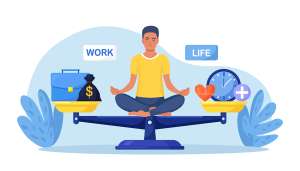In an era where technology, particularly Artificial Intelligence (AI), is revolutionizing the way we work and live, the human qualities of empathy, affection, and emotional intelligence remain irreplaceable. While AI can perform many tasks with efficiency and precision, it lacks the capacity to connect on a deeply human level. Therefore, prioritizing personal well-being and maintaining a harmonious work-life balance is more crucial than ever. The old cliché “the world is well if you are well” holds significant truth, emphasizing the importance of self-care in leading a fulfilling life. This article explores the intricacies of achieving work-life harmony and the essential role of self-care in preserving our unique human qualities.
The Changing Landscape of Work
The advent of AI and automation has transformed the workplace, enhancing productivity and creating new opportunities. However, this technological shift also brings challenges, particularly in maintaining a balance between professional and personal life. As AI handles more routine tasks, the human workforce is increasingly expected to engage in creative, strategic, and emotionally intelligent roles.
technological shift also brings challenges, particularly in maintaining a balance between professional and personal life. As AI handles more routine tasks, the human workforce is increasingly expected to engage in creative, strategic, and emotionally intelligent roles.
- Increased Expectations: With AI managing administrative and repetitive tasks, human workers are often expected to deliver more in terms of creativity, problem-solving, and leadership. This can lead to heightened stress and pressure, making it even more important to prioritize self-care.
- Blurring Boundaries: The rise of remote work and digital communication tools has blurred the lines between work and personal life. While flexibility can be beneficial, it also makes it harder to disconnect from work, leading to potential burnout.
- Need for Emotional Intelligence: As AI handles data-driven tasks, the human ability to connect, empathize, and lead with emotional intelligence becomes a key differentiator. This underscores the need to nurture our emotional well-being and interpersonal skills.
Prioritizing Personal Well-Being
 Personal well-being is the foundation of a balanced and fulfilling life. By prioritizing self-care, we can enhance our capacity to perform effectively at work while maintaining healthy relationships and a positive outlook on life.
Personal well-being is the foundation of a balanced and fulfilling life. By prioritizing self-care, we can enhance our capacity to perform effectively at work while maintaining healthy relationships and a positive outlook on life.
- Understanding Self-Care: Self-care involves activities and practices that we engage in regularly to reduce stress and enhance our health and well-being. It is a conscious act to promote physical, mental, and emotional health.
- Physical Health: Regular exercise, a balanced diet, and adequate sleep are fundamental to maintaining physical health. Physical well-being directly impacts our energy levels, productivity, and overall mood.
- Mental Health: Mental health is just as important as physical health. Practices such as mindfulness, meditation, and pursuing hobbies can help manage stress and anxiety. Seeking professional help when needed is also a crucial aspect of self-care.
- Emotional Health: Emotional well-being involves understanding and managing our emotions, building resilience, and fostering healthy relationships. It includes practices like journaling, talking to a trusted friend, or engaging in activities that bring joy and fulfilment.
Achieving Work-Life Harmony
Work-life harmony is not about achieving a perfect balance but rather finding a dynamic equilibrium that works for you. It involves integrating work and personal life in a way that supports overall well-being and fulfilment.
integrating work and personal life in a way that supports overall well-being and fulfilment.
- Setting Boundaries: Clearly defined boundaries between work and personal life are essential. This could mean setting specific work hours, creating a dedicated workspace, and avoiding work-related tasks during personal time.
- Time Management: Effective time management involves prioritizing tasks, delegating when possible, and avoiding procrastination. Tools such as calendars, to-do lists, and productivity apps can help manage time efficiently.
- Flexible Work Arrangements: Flexible work schedules can help accommodate personal responsibilities and preferences. This could include remote work, flexible hours, or compressed workweeks.
- Taking Breaks: Regular breaks during work hours can prevent burnout and maintain productivity. Techniques like the Pomodoro Technique, which involves working for 25 minutes followed by a 5-minute break, can be effective.
- Unplugging: In a digitally connected world, it’s important to unplug from devices periodically. Digital detoxes, such as not checking emails after work hours or limiting social media use, can help reduce stress and improve focus.
- Pursuing Passions: Engaging in activities outside of work that bring joy and fulfilment is vital. Whether it’s a hobby, a sport, or spending time with loved ones, these activities can recharge and rejuvenate you.
The Role of Empathy and Human Connection
In a world increasingly dominated by technology, empathy and human connection remain essential. These qualities not only enhance our personal relationships but also improve workplace dynamics and leadership effectiveness.
- Empathy in Leadership: Leaders who demonstrate empathy can create more engaged and motivated teams. Understanding employees’ perspectives and showing compassion can lead to higher job satisfaction and productivity.
- Building Relationships: Strong interpersonal relationships are built on trust, communication, and empathy. Investing time and effort in nurturing these relationships is crucial for personal and professional growth.
- Collaborative Work Environment: A workplace that values empathy and human connection fosters collaboration and innovation. Encouraging open communication, teamwork, and mutual support can create a positive and productive work environment.
Practical Tips for Maintaining Work-Life Harmony and Self-Care
Implementing the principles of work-life harmony and self-care requires practical strategies and consistent effort. Here are some tips to help you get started:
- Create a Routine: Establish a daily routine that includes time for work, self-care, and personal activities. Consistency can help create a sense of balance and stability.
- Prioritize Tasks: Focus on high-priority tasks and avoid multitasking. Break larger tasks into smaller, manageable steps to reduce overwhelm.
- Schedule Downtime: Just as you schedule work tasks, schedule downtime for relaxation and leisure. Treat this time as non-negotiable to ensure you get the rest you need.
- Set Realistic Goals: Set achievable goals for both work and personal life. Unrealistic expectations can lead to frustration and burnout.
- Practice Mindfulness: Incorporate mindfulness practices into your daily routine to stay present and manage stress. Simple techniques like deep breathing, meditation, or mindful walking can make a significant difference.
- Seek Support: Don’t hesitate to seek support from friends, family, or professionals when needed. Having a strong support network can help you navigate challenges more effectively.
- Learn to Say No: Recognize your limits and don’t overcommit. Learning to say no to additional responsibilities that don’t align with your priorities is crucial for maintaining balance.
- Reflect and Adjust: Regularly reflect on your work-life balance and self-care practices. Be open to making adjustments as needed to ensure you are meeting your needs.
Conclusion
In a world where technology is rapidly advancing, preserving our uniquely human qualities and prioritizing self-care are more important than ever. Achieving work-life harmony is not a one-size-fits-all solution but a dynamic process that requires ongoing effort and self-awareness. By setting boundaries, managing time effectively, and prioritizing physical, mental, and emotional well-being, we can navigate the demands of modern life while maintaining our humanity. Remember, the world is well if you are well. Prioritizing your well-being is not a luxury but a necessity for leading a balanced, fulfilling life.





